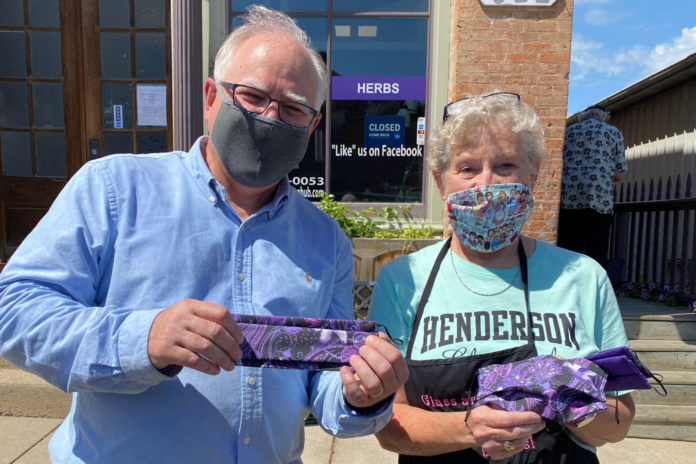A lawsuit being brought by the Minnesota Voters Alliance, along with several individual plaintiffs, is challenging Gov. Tim Walz’s mask mandate in federal court.
The lawsuit claims that Minnesota has had a law on the books since 1963 — Minnesota Statute 609.735 — which makes it illegal to wear a mask in public. Yet according to a press release put out by a PR firm representing the plaintiffs, “Tim Walz’s Executive Order 20-81, issued July 22, 2020” makes it “illegal to appear in public without a protective face mask.”
Actually, Walz’s order makes it illegal to be without a mask in “all indoor businesses and public indoor spaces, unless alone,” but this certainly applies to polling places and voting booths. And the plaintiffs’ complaint is geared toward clarifying the rules on masks when going to the polls, before the Aug. 11 primary election, which will ostensibly set the policy for the November election. The suit specifically asks that the governor’s executive order be blocked by the court for people who vote in the upcoming primary.
Erick Kaardal, the attorney representing the plaintiffs, put it this way:
“No one in this case is saying that mask wearing isn’t a good thing. It’s just in this case the State of Minnesota has created conflicting laws where people are criminally prosecuted for wearing a mask and for not wearing a mask. The executive and legislative branch must decide which law prevails. Meanwhile, failing to do so has created a chilling effect on the plaintiffs who wish to exercise their political rights protected by the First Amendment —including in-person voting in the polling place on primary day, Aug. 11.”
The governor “can’t have it both ways,” Kaardal said. He continued:
“His poorly thought out executive orders compel upstanding law-abiding citizens to wear face masks or face criminal fines, and in some circumstances, imprisonment. Those same individuals, complying with Walz’s order, are forced to violate longstanding Minnesota law, and by doing so commit a criminal act, punishable by up to 90 days imprisonment and/or a $1000 fine. With the specter of threatened prosecution hanging over those who show up barefaced at polls on primary election day, upstanding voters are faced only with the option of breaking another, well-established state law.”
The suit is also being supported by the New House Republican Caucus, a conservative outfit that has broken away from the GOP in the House, due to the ability to have its own staff and resources, and a strong feeling among its members that GOP House leadership was strong-arming them on votes. The caucus is made up of state Reps. Steve Drazkowski, Cal Bahr, Tim Miller, and Jeremy Munson.
“The governor’s unilateral executive orders are an affront to transparency, accountability, and a constitutional process. We have challenged these orders since day one and will not be silent as long as the governor continues to act like a dictatorial monarch,” said Munson.
One issue the suit may have to overcome is the non-specific language of the 1963 law in question, which reads: “A person whose identity is concealed by the person in a public place by means of a robe, mask, or other disguise, unless based on religious beliefs, or incidental to amusement, entertainment, protection from weather, or medical treatment, is guilty of a misdemeanor.”
In other words, the state will likely argue that Walz’s order doesn’t conflict with 609.735 because wearing a mask over the nose and mouth doesn’t “conceal one’s identity.” Nevertheless, a voting rights issue may also be at play — as those who show up to the polls and forget a mask, or don’t have access to a mask, could be turned away on Election Day.
The Minnesota Voters Alliance suit seeks an injunction before the primary to stop Walz’s order from being enforced, and Kaardal said that he wants the Legislature to decide which law prevails.











